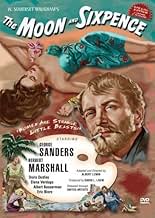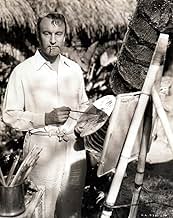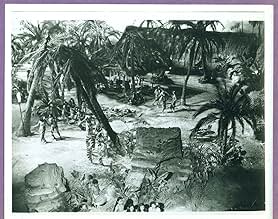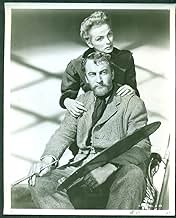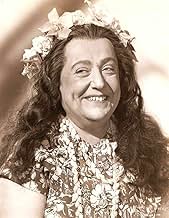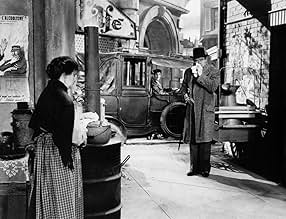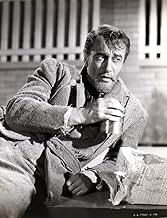Ajouter une intrigue dans votre langueLoosely inspired by Gauguin's life, the story of Charles Strickland, a middle-aged stockbrocker who abandons his middle-class life, his family, and his duties to start painting, as he has al... Tout lireLoosely inspired by Gauguin's life, the story of Charles Strickland, a middle-aged stockbrocker who abandons his middle-class life, his family, and his duties to start painting, as he has always wanted to do. He is from then on a awful human being, wholly devoted to his ideal: be... Tout lireLoosely inspired by Gauguin's life, the story of Charles Strickland, a middle-aged stockbrocker who abandons his middle-class life, his family, and his duties to start painting, as he has always wanted to do. He is from then on a awful human being, wholly devoted to his ideal: beauty.
- Nommé pour 1 Oscar
- 3 victoires et 2 nominations au total
- Dirk Stroeve
- (as Steve Geray)
- Native Boy at Wedding
- (non crédité)
- Man Seated in Paris Dive
- (non crédité)
- Tiare's Cook
- (non crédité)
- Party Guest
- (non crédité)
- Maitland - Wolfe's Valet
- (non crédité)
- The Leper
- (non crédité)
- Col. Fred MacAndrew
- (non crédité)
- Amy Strickland
- (non crédité)
- Tough Bill
- (non crédité)
- French Floozie
- (non crédité)
Histoire
Le saviez-vous
- AnecdotesHerbert Marshall plays the writer Geoffrey Wolfe, a fictional alter ego of author W. Somerset Maugham. Marshall played Somerset Maugham in Le fil du rasoir (1946), and appeared in several adaptations of Maugham's works, including Le Voile des illusions (1934) and both the 1929 and 1940 versions of La Lettre (1940).
- GaffesStrickland mispronounces Papeete (the capital of Tahiti) as "Pah-peet-ee". The correct pronunciation, as any resident of Tahiti would know, is "Pah-pay-ay-tay".
- Versions alternativesThere is a tinted and a color sequence toward the end of the film, both of which have recently been restored, but for many years this film was seen only in black-and-white.
- ConnexionsReferenced in Spring in Park Lane (1948)
- Bandes originalesWe, Three Kings of Orient Are
(uncredited)
Traditional
I recently saw this movie for the first time on TCM. It is one of the most "startling" and highly original movies I have seen from that era of filmmaking.
Almost never does a movie affect me emotionally--not only as I saw it but even a couple of weeks later I am still affected by it.
Among the many things that are so powerful is the relentless negativity of the George Sanders' character throughout. And yet he makes us feel he is on a mission to be true to himself and to fulfill his destiny without apology.
To combine these elements in one character is something I have never seen in any movie. It left me confused emotionally and yet felt admiringly of someone who can eschew all human concern for others(with one exception which I will not spoil) to relentlessly pursue what he perceives as his truth and destiny.
It is a brilliant achievement in George Sanders' acting and for the directors' unapologetic vision of the movie.
I have to be careful not to spoil, but among many amazing surprises is how another artists' wife(Blanche Stroeve played by Doris Dudley whom I knew in real life) reacts to Sanders after she, at her husband's insistence, nurses him back to health. It is an amazing scene. Yet somehow we understand that Sander's purpose is so well-defined and his masculinity is so caveman-like that she cannot help but respond to him.
Definitely not politically correct. I cannot imagine a scene like this even being allowed to be shot in this way in any modern movie.
Speaking of political correctness, other surprises abound in this area particularly during the time the Sanders character moves to Tahiti.
Not to spoil but listen closely as a certain older woman who interacts with Sanders describe her long ago love affairs and the character of the men she was involved with.
If any woman was to pine for love affairs like she describes in today's world, she would be denounced by every women's group on the planet. And yet she pines for those days with infectious gusto and enthusiasm.
A movie shot like this today would set women back a couple of hundred years. It could not be remade today and still retain all the wild political incorrectness. Protests and boycotts would stop the movie from being made if word got out of it's script's contents.
A great, emotionally draining, disturbing and thoroughly unique movie that will always stand alone and cannot be remade without huge rewrites.
One brief note of interest. One of the female leads, Doris Dudley, lived about a quarter mile from me in the early 1980's. The location was a little community called Jacobia, Tx. Her obituary says Greenville, Tx. which is also correct.
She invited me and my parents to some kind of little get together at her modest country home. She was outgoing, friendly and yet had a powerful energy to her that somehow made me understand why she was an actress.
She told me she was in the movies many years ago and her movie/stage name was Doris Dudley. She originally introduced herself as Doris Jenkins.
She mentioned that she knew Cary Grant. She may have said she worked with him but I'm not sure. She was in her mid 60's and long since retired from being an actress by the time I met her. She loved her dogs. And shortly after I met her she learned she had terminal cancer and died shortly thereafter. When I asked her about it, I was struck by how unafraid she was of dying. I brought her a little newspaper article about someone beating cancer I thought might cheer her up. But she did not need any help. Her courage in facing death infused me with courage. I shall never forget her.
There is only one biography of her I can find on the internet. She was a lovely, dynamic woman. She was terrific in this movie. I miss visiting with her.
- krosny-244-673957
- 19 déc. 2011
- Permalien
Meilleurs choix
- How long is The Moon and Sixpence?Alimenté par Alexa
Détails
Box-office
- Budget
- 401 000 $US (estimé)
- Durée1 heure 29 minutes
- Rapport de forme
- 1.37 : 1
Contribuer à cette page


